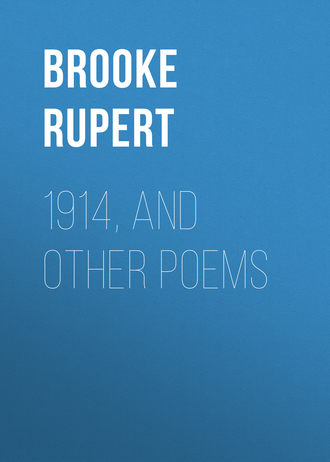1914, and Other Poems
 полная версия
полная версия1914, and Other Poems
Жанр: зарубежная поэзиязарубежная классиказарубежная старинная литературасерьезное чтениеcтихи, поэзия
Язык: Английский
Год издания: 2017
Добавлена:
Настройки чтения
Размер шрифта
Высота строк
Поля
BEAUTY AND BEAUTY
When Beauty and Beauty meetAll naked, fair to fair,The earth is crying-sweet,And scattering-bright the air,Eddying, dizzying, closing round,With soft and drunken laughter;Veiling all that may befallAfter – after —Where Beauty and Beauty met,Earth's still a-tremble there,And winds are scented yet,And memory-soft the air,Bosoming, folding glints of light,And shreds of shadowy laughter;Not the tears that fill the yearsAfter – after —THE WAY THAT LOVERS USE
The way that lovers use is this;They bow, catch hands, with never a word,And their lips meet, and they do kiss,– So I have heard.They queerly find some healing so,And strange attainment in the touch;There is a secret lovers know,– I have read as much.And theirs no longer joy nor smart,Changing or ending, night or day;But mouth to mouth, and heart on heart,– So lovers say.MARY AND GABRIEL
Young Mary, loitering once her garden way,Felt a warm splendour grow in the April day,As wine that blushes water through. And soon,Out of the gold air of the afternoon,One knelt before her: hair he had, or fire,Bound back above his ears with golden wire,Baring the eager marble of his face.Not man's nor woman's was the immortal graceRounding the limbs beneath that robe of white,And lighting the proud eyes with changeless light,Incurious. Calm as his wings, and fair,That presence filled the garden.She stood there,Saying, "What would you, Sir?"He told his word,"Blessed art thou of women!" Half she heard,Hands folded and face bowed, half long had known,The message of that clear and holy tone,That fluttered hot sweet sobs about her heart;Such serene tidings moved such human smart.Her breath came quick as little flakes of snow.Her hands crept up her breast. She did but knowIt was not hers. She felt a trembling stirWithin her body, a will too strong for herThat held and filled and mastered all. With eyesClosed, and a thousand soft short broken sighs,She gave submission; fearful, meek, and glad…She wished to speak. Under her breasts she hadSuch multitudinous burnings, to and fro,And throbs not understood; she did not knowIf they were hurt or joy for her; but onlyThat she was grown strange to herself, half lonely,All wonderful, filled full of pains to comeAnd thoughts she dare not think, swift thoughts and dumb,Human, and quaint, her own, yet very far,Divine, dear, terrible, familiar…Her heart was faint for telling; to relateHer limbs' sweet treachery, her strange high estate,Over and over, whispering, half revealing,Weeping; and so find kindness to her healing.'Twixt tears and laughter, panic hurrying her,She raised her eyes to that fair messenger.He knelt unmoved, immortal; with his eyesGazing beyond her, calm to the calm skies;Radiant, untroubled in his wisdom, kind.His sheaf of lilies stirred not in the wind.How should she, pitiful with mortality,Try the wide peace of that felicityWith ripples of her perplexed shaken heart,And hints of human ecstasy, human smart,And whispers of the lonely weight she bore,And how her womb within was hers no moreAnd at length hers?Being tired, she bowed her head;And said, "So be it!"The great wings were spreadShowering glory on the fields, and fire.The whole air, singing, bore him up, and higher,Unswerving, unreluctant. Soon he shoneA gold speck in the gold skies; then was gone.The air was colder, and grey. She stood alone.THE FUNERAL OF YOUTH: THRENODY
The day that Youth had died,There came to his grave-side,In decent mourning, from the county's ends,Those scatter'd friendsWho had lived the boon companions of his prime,And laughed with him and sung with him and wasted,In feast and wine and many-crown'd carouse,The days and nights and dawnings of the timeWhen Youth kept open house,Nor left untastedAught of his high emprise and ventures dear,No quest of his unshar'd —All these, with loitering feet and sad head bar'd,Followed their old friend's bier.Folly went first,With muffled bells and coxcomb still revers'd;And after trod the bearers, hat in hand —Laughter, most hoarse, and Captain Pride with tannedAnd martial face all grim, and fussy Joy,Who had to catch a train, and Lust, poor, snivelling boy;These bore the dear departed.Behind them, broken-hearted,Came Grief, so noisy a widow, that all said,"Had he but wedHer elder sister Sorrow, in her stead!"And by her, trying to soothe her all the time,The fatherless children, Colour, Tune, and Rhyme(The sweet lad Rhyme), ran all-uncomprehending.Then, at the way's sad ending,Round the raw grave they stay'd. Old Wisdom read,In mumbling tone, the Service for the Dead.There stood Romance,The furrowing tears had mark'd her rougèd cheek;Poor old Conceit, his wonder unassuaged;Dead Innocency's daughter, Ignorance;And shabby, ill-dress'd Generosity;And Argument, too full of woe to speak;Passion, grown portly, something middle-aged;And Friendship– not a minute older, she;Impatience, ever taking out his watch;Faith, who was deaf, and had to lean, to catchOld Wisdom's endless drone.Beauty was there,Pale in her black; dry-eyed; she stood alone.Poor maz'd Imagination; Fancy wild;Ardour, the sunlight on his greying hair;Contentment, who had known Youth as a childAnd never seen him since. And Spring came too,Dancing over the tombs, and brought him flowers —She did not stay for long.And Truth, and Grace, and all the merry crew,The laughing Winds and Rivers, and lithe Hours;And Hope, the dewy-eyed; and sorrowing Song; —Yes, with much woe and mourning general,At dead Youth's funeral,Even these were met once more together, all,Who erst the fair and living Youth did know;All, except only Love. Love had died long ago.GRANTCHESTER
THE OLD VICARAGE, GRANTCHESTER
(Café des Westens, Berlin, May 1912)Just now the lilac is in bloom,All before my little room;And in my flower-beds, I think,Smile the carnation and the pink;And down the borders, well I know,The poppy and the pansy blow…Oh! there the chestnuts, summer through,Beside the river make for youA tunnel of green gloom, and sleepDeeply above; and green and deepThe stream mysterious glides beneath,Green as a dream and deep as death.– Oh, damn! I know it! and I knowHow the May fields all golden show,And when the day is young and sweet,Gild gloriously the bare feetThat run to bathe…Du lieber Gott!Here am I, sweating, sick, and hot,And there the shadowed waters freshLean up to embrace the naked flesh.Temperamentvoll German JewsDrink beer around; – and there the dewsAre soft beneath a morn of gold.Here tulips bloom as they are told;Unkempt about those hedges blowsAn English unofficial rose;And there the unregulated sunSlopes down to rest when day is done,And wakes a vague unpunctual star,A slippered Hesper; and there areMeads towards Haslingfield and CotonWhere das Betreten's not verboten.εϊθε γενοίμην… Would I wereIn Grantchester, in Grantchester! —Some, it may be, can get in touchWith Nature there, or Earth, or such.And clever modern men have seenA Faun a-peeping through the green,And felt the Classics were not dead,To glimpse a Naiad's reedy head,Or hear the Goat-foot piping low:…But these are things I do not know.I only know that you may lieDay long and watch the Cambridge sky,And, flower-lulled in sleepy grass,Hear the cool lapse of hours pass,Until the centuries blend and blurIn Grantchester, in Grantchester…Still in the dawnlit waters coolHis ghostly Lordship swims his pool,And tries the strokes, essays the tricks,Long learnt on Hellespont, or Styx.Dan Chaucer hears his river stillChatter beneath a phantom mill.Tennyson notes, with studious eye,How Cambridge waters hurry by…And in that garden, black and white,Creep whispers through the grass all night;And spectral dance, before the dawn,A hundred Vicars down the lawn;Curates, long dust, will come and goOn lissom, clerical, printless toe;And oft between the boughs is seenThe sly shade of a Rural Dean…Till, at a shiver in the skies,Vanishing with Satanic cries,The prim ecclesiastic routLeaves but a startled sleeper-out,Grey heavens, the first bird's drowsy calls,The falling house that never falls.God! I will pack, and take a train,And get me to England once again!For England's the one land, I know,Where men with Splendid Hearts may go;And Cambridgeshire, of all England,The shire for Men who Understand;And of that district I preferThe lovely hamlet Grantchester.For Cambridge people rarely smile,Being urban, squat, and packed with guile;And Royston men in the far SouthAre black and fierce and strange of mouth;At Over they fling oaths at one,And worse than oaths at Trumpington,And Ditton girls are mean and dirty,And there's none in Harston under thirty,And folks in Shelford and those partsHave twisted lips and twisted hearts,And Barton men make Cockney rhymes,And Coton's full of nameless crimes,And things are done you'd not believeAt Madingley, on Christmas Eve.Strong men have run for miles and miles,When one from Cherry Hinton smiles;Strong men have blanched, and shot their wives,Rather than send them to St. Ives;Strong men have cried like babes, bydam,To hear what happened at Babraham.But Grantchester! ah, Grantchester!There's peace and holy quiet there,Great clouds along pacific skies,And men and women with straight eyes,Lithe children lovelier than a dream,A bosky wood, a slumbrous stream,And little kindly winds that creepRound twilight corners, half asleep.In Grantchester their skins are white;They bathe by day, they bathe by night;The women there do all they ought;The men observe the Rules of Thought.They love the Good; they worship Truth;They laugh uproariously in youth;(And when they get to feeling old,They up and shoot themselves, I'm told)…Ah God! to see the branches stirAcross the moon at Grantchester!To smell the thrilling-sweet and rottenUnforgettable, unforgottenRiver-smell, and hear the breezeSobbing in the little trees.Say, do the elm-clumps greatly standStill guardians of that holy land?The chestnuts shade, in reverend dream,The yet unacademic stream?Is dawn a secret shy and coldAnadyomene, silver-gold?And sunset still a golden seaFrom Haslingfield to Madingley?And after, ere the night is born,Do hares come out about the corn?Oh, is the water sweet and cool,Gentle and brown, above the pool?And laughs the immortal river stillUnder the mill, under the mill?Say, is there Beauty yet to find?And Certainty? and Quiet kind?Deep meadows yet, for to forgetThe lies, and truths, and pain?.. oh! yetStands the Church clock at ten to three?And is there honey still for tea?

